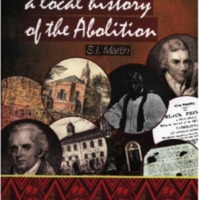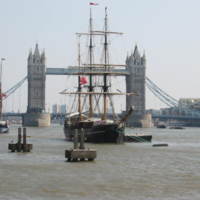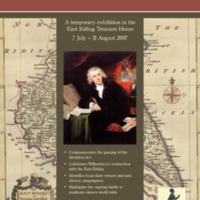
Lambeth and the Abolition
The Lambeth and the Abolition programme included debates, historic trails, a video conferencing discussion between people in Brixton, Ghana and Jamaica, Caribbean family history classes, creative writing workshops, and a dedicated series of events within Black History Month. ‘The Runaways’, an original drama about a runaway slave boy and a kitchen maid in London in 1700, was performed in Lambeth primary schools, accompanied by a workshop. The project researched the local historical links to abolition, and famously the activities of the Clapham Sect (William Wilberforce and his associates) who attended Holy Trinity Church in Clapham. A booklet by historian S. I. Martin sets the history of abolition in the larger context, through his study of the African Academy at Clapham, and his mapping of some of the links between Lambeth, Jamaica and West Africa at the beginning of the 19th century.

Spirit of Wilberforce
The Centre for Contemporary Ministry (CCM) is an educational charity specialising in the study of contemporary social issues. The CCM established a slavery exhibition at their base, Moggerhanger Park in Bedfordshire, once country home of members of the Thornton family, cousins of William Wilberforce. A mobile travelling display toured local venues. ‘Free at Last?’ was also part of the Spirit of Wilberforce project. This initiative saw a replica of the 18th century slave ship ‘Zong’ sail into London on 29 March 2007. The replica ship was accompanied up the River Thames by HMS Northumberland as part of the Royal Navy’s contributions to the bicentenary. The ‘Slavery Past and Present’ exhibition on board the replica was opened by the Mayor of London – a virtual reality display depicted conditions on a slave ship. The exhibition continued at the church All Hallows by the Tower, exploring the work of the abolitionists and the legacy of slavery. HMS Northumberland also opened to the public - an exhibition on board explored the role of the Royal Navy in enforcing the 1807 Act.

William Wilberforce, Slavery and the East Riding
Alongside commemorating the passing of the 1807 Abolition Act, the ‘William Wilberforce, Slavery and the East Riding’ exhibition at the Treasure House in Beverley also highlighted Wilberforce’s connections with the East Riding of Yorkshire. The exhibition traced the roots of the Wilberforce family back to the early 13th century, and narrated the story of William Wilberforce’s early life in a family of merchants, and later, his significant contributions to the abolition campaign. It also looked at the other links between the East Riding and slavery, in the family fortunes of the Beverley family and Watt family, founded on ownership of slave plantations, but also the anti-slavery societies established in the region. The exhibition ended by highlighting the plight of the millions of people still enslaved across the world today, and discussed some of the contemporary antislavery efforts.